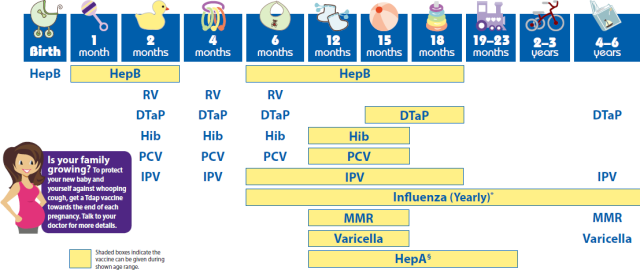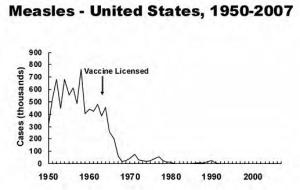
Credit: San Antonio Metropolitan Health District
We believe that vaccinations are safe and effective in preventing disease in children. Not only do vaccinations prevent the child from developing a potential life-threatening disease, but they also prevent that child from spreading disease to friends and family members. Vaccinations are usually covered under health insurance plans, but are also federally funded, making them an affordable and easily accessible means of protecting a child. In the past, vaccines have reduced and even eliminated diseases that have affected other generations. Thus, by providing vaccinations to children, we not only protect them from diseases but we also contribute to the elimination of life-threatening diseases such as measles and polio.
The federal government currently has no role in recommending, approving, or enforcing policies that mandate vaccinations for children. According to VaccineEthics.org, the federal government’s Department of Health and Human Services and its agencies – notably the Food and Drug Administration (FDA) and Centers for Disease Control and Prevention (CDC) – “licenses new vaccines for use in the U.S., provides recommendations on populations for whom specific vaccines should be administered, finances vaccines for uninsured or underinsured children, monitors vaccine safety, and promotes vaccination nationwide.”
Only state public health officials and state legislatures can make the decision to add a vaccine to a state’s required vaccination schedule. In order to add a vaccine requirement, it is currently necessary for the legislature to pass a bill signed by the governor, or for a health department to issue certain regulations. This can be a tedious process and also causes variability in which vaccinations are required from state to state and who is required to receive them. For example, North Carolina requires that home-schooled children receive vaccinations, but all other 49 states do not require this. Also, some states require only measles and rubella vaccines while other states require the mumps, polio, and tetanus in addition to measles and rubella vaccines.
Another concern is while all 50 states require various school-entry vaccinations, many parents opt their children out for reasons other than medical causes. These reasons include religious and philosophical values, concerns the shots themselves could cause illness, and a belief that allowing children to get sick helps them to build a stronger immune system. In response to this, Hannah Dreier says public health officials state that, “regardless of why parents choose not to vaccinate their children, the result is the same: an increased risk of an outbreak of whooping cough or other communicable diseases.” It is very easy for parents to opt out their children, because they simply have to sign a document claiming their child as exempt. While state legislatures can approve a bill requiring parents to discuss vaccinations with a pediatrician or a school nurse before they can opt out, the federal government cannot.
We believe that the federal government should hold certain responsibility in regard to vaccinations, and we propose that the government enact a federal law that would create tighter restrictions on receiving exemptions. This federal law should also create a standardized list of the required immunizations that all children should receive, based on advice from a collection of medical professionals. Increasing immunization rates for children is critical to controlling the outbreak of diseases.
We hope to show our readers that it is necessary for children to receive vaccinations, and the government should enact a federal law to enforce these vaccinations because of the importance of immunizations for children.
Thanks to the following sources for information cited in this post:





